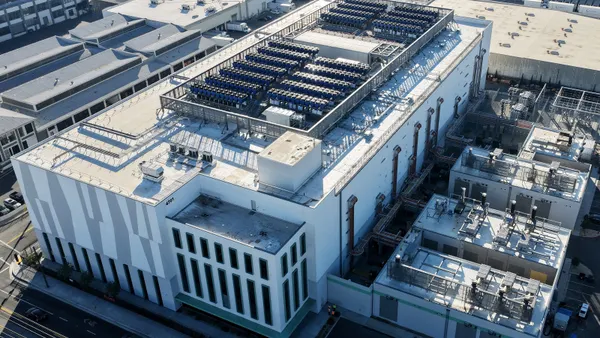Dive Brief:
- The Nevada Public Utilities Commission (PUC) has approved NV Energy's first electric vehicle infrastructure program, authorizing $15 million to incentivize the development of publicly available charging stations.
- Along with the EV program, the utility can spend $5 million each for small and large energy storage incentives. Those programs are also new, and have not been initiated yet. NV Energy plans to get them running no later than Sept. 1.
- The new EV program was authorized by Senate Bill 145, and integrated with a broad, years-old $295 million legislative mandate that includes solar incentives and other renewables. As incentives have been paid out, there is roughly $40 million left in authorized funding. A stipulation reached by several parties was approved by the PUC, setting the latest incentive levels last week.
Dive Insight:
NV Energy has had an EV time of use (TOU) rate for a decade, but will now also be incentivizing development of charging stations.
Nevada wants to expand electric vehicle adoption across the state, and not just in densely-populated areas. To that end, the state and NV Energy have partnered on the Nevada Electric Highway joint initiative, to increase access to charging infrastructure between the state's major urban centers and mitigate customers' range anxiety.
The electric highway program aims to place charging stations at "cost-effective and strategic locations, initially along U.S. 95 between Reno and Las Vegas," according to the project's web site.
NV Energy's new EV infrastructure program will support the electric highway initiative as well as boosting charging options in public areas. The utility will offer up to $15,000 for the installation of a DC Fast Charger, and up to $3,000 for Level 2 charging.
NV Energy has done charging infrastructure projects before, but in the past it was more of a pilot-sized initiative, Senior VP of Customer Operations Pat Egan told Utility Dive. The utility previously installed about 50 chargers in a range of locations, from casinos to universities.
"That was more of an encapsulated public demonstration program," Egan said. "This is more of a broader public application."
In May, Nevada regulators decided to allow NV Energy to own and operate charging stations and to include them in its rate base. Funding from the Electric Vehicle Infrastructure Demonstration program, however, cannot be used on utility-owned stations.
NV Energy expects to begin taking the first EV and storage incentive applications no later than September.
Incentives for small storage projects will be capped at $3,000, based on a $/Wh rate. Starting in the 2018-2019 program year, the incentive would be $0.22/Wh for residential customers on a TOU rate, and $0.11/Wh for residential customers who are not.
For large storage projects, incentives are capped at $200,000, with incentives of $0.30/Wh for non-critical infrastructure programs and $0.40/Wh for critical. There is also a $0.02/Wh decline for each $1 million in incentives that is reserved.
On the renewable side, the stipulation reduced the incentive for residential solar projects from $0.24/watt to $0.20/watt.
"The incentive was originally designed to support the market, and as equipment costs go down, there is less of a need for some of those incentives," Egan said.
In its order last Wednesday, the PUC also directed NV Energy to set aside $1 million annually, for six years, to develop solar generation resources that benefit low-income customers.












